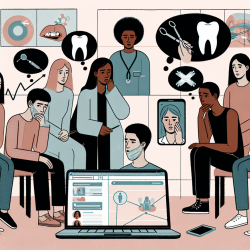Introduction
In the ever-evolving field of speech-language pathology, staying informed and continually enhancing our skills is crucial. As practitioners, leveraging historical insights and research findings can significantly improve our service delivery. One such compelling resource is the research article titled "The Life and Times of Dr. Christopher Widmer," which provides valuable lessons for modern practitioners.
Key Insights from Dr. Christopher Widmer's Research
Dr. Christopher Widmer's contributions to the medical field, particularly in speech-language pathology, offer a wealth of knowledge. His research underscores the importance of a patient-centered approach, meticulous documentation, and the integration of innovative techniques in therapy.
- Patient-Centered Approach: Dr. Widmer emphasized understanding the unique needs of each patient. By tailoring therapy sessions to individual requirements, practitioners can enhance the efficacy of interventions.
- Meticulous Documentation: Accurate record-keeping was a cornerstone of Dr. Widmer's practice. Detailed documentation not only aids in tracking progress but also facilitates better communication with other healthcare professionals.
- Innovative Techniques: Dr. Widmer was a proponent of adopting new methodologies. As practitioners, staying abreast of technological advancements and incorporating them into therapy can lead to improved outcomes.
Implementing Research Findings in Practice
To translate Dr. Widmer's insights into practice, practitioners can adopt several strategies:
- Personalized Therapy Plans: Develop therapy plans that cater to the specific needs and goals of each child. This approach not only fosters engagement but also accelerates progress.
- Regular Training and Development: Engage in continuous professional development to stay updated with the latest research and techniques in speech-language pathology.
- Utilizing Technology: Incorporate digital tools and platforms, such as TinyEYE's online therapy services, to enhance the accessibility and effectiveness of therapy sessions.
Encouraging Further Research
While Dr. Widmer's research provides a solid foundation, it is essential for practitioners to engage in ongoing research. By contributing to the body of knowledge in speech-language pathology, practitioners can drive innovation and improve therapeutic outcomes.
Conclusion
Dr. Christopher Widmer's work remains a beacon for speech-language pathologists seeking to enhance their practice. By implementing his insights and committing to continuous learning, practitioners can create better outcomes for children. To delve deeper into Dr. Widmer's research, I encourage you to read the original research paper, The Life and Times of Dr. Christopher Widmer.










